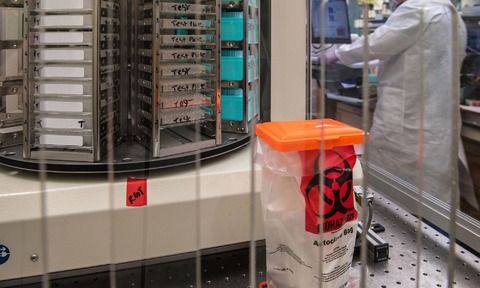
Despite laboratories’ longstanding reliance upon microbial culture for infectious disease identification, the pressures of the pandemic have increased interest in the uses of alternatives, not least molecular diagnostics, argues Tim Simpson.
The Covid-19 pandemic saw an explosion in the field of diagnostic testing, as the industry sought to keep up with an unprecedented volume. It also brought molecular science into the public consciousness like never before – acronyms like ‘PCR’ and ‘mRNA’ became familiar in households across the world.
This paradigm shift reflects the growing recognition that molecular diagnostics not only delivers faster and more accurate outcomes but also carries the potential to transform the way we approach disease detection and monitoring in the coming years.
Covid-19 has also drawn attention to the potential need for a widespread population-based infectious disease detection system. Global pandemics are becoming more frequent and so it is crucial for early detection to be able to mitigate the spread of infectious disease.
Molecular testing can play a role in this as it can offer quick identification of the causative agent, which is essential for tailoring the treatment and measuring the efforts for containment.
Given the increased sensitivity of molecular testing versus viral cultures and its quicker turnaround time, it has huge potential to be applied to other fields where speed is crucial. Here are some clinical testing areas where we are starting to see molecular testing change the paradigm.
Bacterial vaginosis (BV):
Historically, the gold standard conventional method of testing BV, one of the most common vaginal conditions, caused by a dysbiosis in the natural flora, is the Amsel criteria or the Nugent scoring system for Gram-stained vaginal smears. However, this has limitations as it relies on the technician’s skill and experience in being able to accurately assess the diagnostic criteria3 – making the process time consuming and subjective.
In recent years, over the counter BV at-home testing kits have become available, and while these offer a preliminary insight, they are not as accurate as molecular testing that is conducted by a medical professional. There are molecular tests on the market which have the advantage over microscopy-based tests as they are objective, able to detect fastidious bacteria and enable semi-quantitation.
Sepsis:
In the UK, there are at least 245,000 cases of sepsis each year, resulting up to 48,000 deaths – more than breast, bowel and prostate cancer combined. Therefore, sepsis is one such field where blood culture analysis can be frustratingly slow, when rapid action is crucial to patient outcomes. A review of emerging molecular technologies for diagnosing sepsis stated that “the swift initiation of precise and targeted antibiotic therapies depends on the ability of a sepsis diagnostic test to capture clinically relevant organisms along with antimicrobial resistance within one to three hours. The administration of appropriate, narrow-spectrum antibiotics demands that such a test be extremely sensitive with a high negative predictive value. In addition, it should utilise small sample volumes and detect polymicrobial infections and contaminants.” The current methods do provide important initial information that can help with the diagnosis process; however, they lack the specificity and speed that molecular testing can provide, leading to potential delays in diagnosis and treatment choices that are crucial in cases for patients with sepsis.
Personalised medicine
People vary significantly in their responses to treatment, lifestyles and genetic makeup, rendering a one size fits all approach to medicine not always effective. Personalised medicine recognises these variations and allows for a more precise diagnoses and treatments. This approach will enhance patient outcomes and contribute to a more effective patient centred healthcare system. Personalised medicine is a huge area of focus in healthcare and expected to benefit up to 2.5 million people in the UK by next year.
Covid-19 has also drawn attention to the potential need for a widespread population-based infectious disease detection system
We believe molecular diagnostics is a vital tool in realising the vision of personalised care, given the importance of having validated biomarkers to inform clinical decision-making. While molecular diagnostics is not a new technology, its application to personalised treatment is considered immature. The future will see molecular diagnostics informing R&D for cancer drug development and predicting disease progression from the point of diagnosis.
Artificial intelligence and machine learning
The use of AI and machine learning (ML) in healthcare settings is becoming more common globally, as we look to synthesise huge amounts of data to inform clinical interventions and predict disease outcomes.
In 2020, Accelerated Access Collaborative (AAC) announced an AI Health and Care Award to support the NHS Long Term Plan. In recent years, several awards have been made to boost pioneering AI technologies that revolutionise and accelerate diagnosis, showing the significance AI is being given by the NHS.
The role of molecular diagnosis is essential, as it will provide much of the quality data input needed to fuel AI-based algorithms. As molecular technology develops, it is likely that even more insight and clinically relevant information will be generated, so it is vital that human experts can be supported to interpret complex diagnostic data sets that would be unachievable within the acute time-frames required.
Tim Simpson is General Manager of Hologic UK & Ireland

